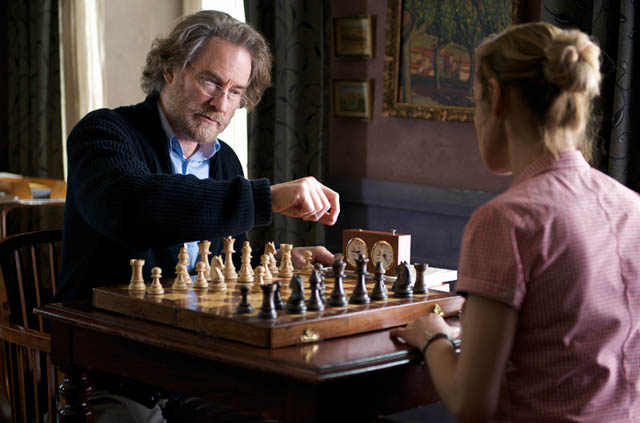Film Review: A Game Well Worth Playing
Queen to Play is an offbeat, feminist fable set in a gorgeous but dirt-poor and provincial part of Corsica.
Queen to Play (Joueuse). Directed by Caroline Bottaro. With Sandrine Bonnaire and Kevin Kline. In French with English subtitles. 97 Minutes. At the West Newton Cinema, Newton, MA.
Whatever your take on the Dominique Strauss-Kahn/Sofitel affair, you’ll find this directorial debut by film-maker Caroline Bottaro a timely and useful guide to the daily life of a hotel maid as well as to the manners and biases of contemporary French society. It is also a quietly brilliant artistic achievement by a director whose work I hope to see more of.
The story of working-class Helene (played by Sandrine Bonnaire), who also cleans the house of American expat Dr. Kroger (played by Kevin Kline in his first French-speaking dramatic role), revolves around multiple games of chess. Helene has glimpsed a pair of rich, young hotel guests on a balcony playing chess and is inspired by the air of romantic intimacy between them to buy her husband a computer chess set for his birthday. Her husband Ange (Francis Renaud) is a handsome but simple boatwright who takes no interest at all in the game. But Helene develops an obsession with it and overcomes her shyness to persuade her American employer to teach her to play. She is particularly struck by his assertion that the most powerful piece in the game is the Queen.
Queen to Play is an offbeat, feminist fable set in a gorgeous but dirt-poor and provincial part of Corsica, inhabited by locals caught in dead-end jobs, sundry tourists passing through on their way to more exciting places, and a thin layer of the famously hierarchical, French middle class. The characters, adapted from the novel The Chess Player by Bertina Henrichs, are finely drawn and beautifully acted by a superb ensemble with nary a weak link.
Although the script is excellent, the silences between lines, during which the camera rests on the principals’ expressive faces, are even better. Kline and Bonnaire are both actors whom the camera loves and who can convey a multiplicity of nuanced emotions with the tensing of a facial muscle. I never tired of watching their faces, nor of the (to me) unfamiliar, Corsican landscape.
There are so few films this summer worth leaving your home for. This is one of them.
Helen Epstein is the translator of Acting in Terezin and author of Joe Papp and other work on Kindle.


Hi
I agree completely; it’s an exceptionally good movie,
I would add that it’s not *only* a feminist fable but a fine chess fable.
Chess, in European culture/history, has at times served as a venue for courtship & romance. So it does in this movie.
In the movie, chess trumps class, connects where class & convention divide.
Plus, that moment when they play what is known as blindfold chess—calling out moves to each other without use of a board or pieces—is a delicious version of what Dr. Spock used to call a mind meld.